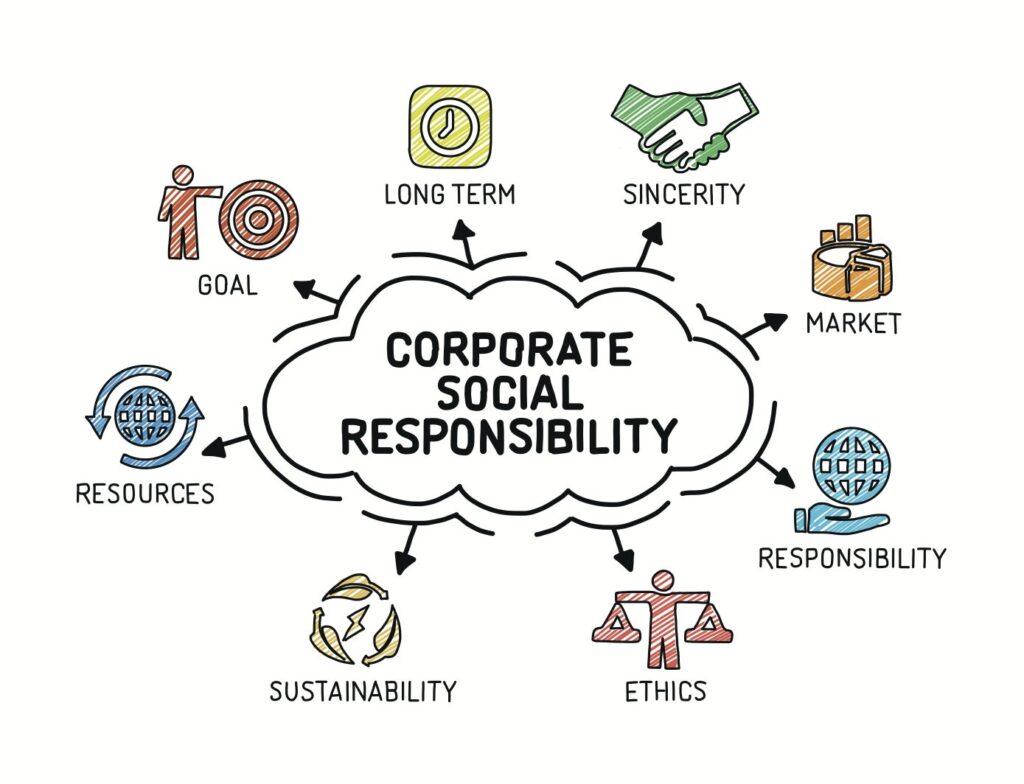Introduction to CSR
Modern company strategies must include corporate social responsibility (CSR). CSR is more than simply a term. Corporate social responsibility (CSR) is businesses owning up to how they harm people and the planet. It’s a way to run a company ethically and sustainably. That will bring long-term growth and respect from stakeholders. The article will discuss CSR secrets for elite entrepreneurs to boost profits & planet.

The Critical Role of Corporate Social Responsibility in Modern Business
Companies in today’s market aim to do good deeds and then do well by them. Corporate social responsibility (CSR) is becoming more important for a company’s survival and growth. Consumers, workers, and investors value ethical and sustainable business practices more.
The Twin Benefits of CSR: Profits and Planet
Improving the Public’s Perception of the Brand
Companies with strong CSR programs tend to have better public perceptions. This, in turn, attracts more customers who want to do business with ethical companies. Sales and profitability might rise as a result of this favorable reputation.
Raising Client Devotion
Companies that stand up for what’s right and try to improve society and the environment tend to have more devoted customers. Customers loyal to a brand are more likely to buy from them again and recommend them to others.
Companies concerned about their global influence attract and retain top talent. Staff members who are competent and enthusiastic about making a positive impact are easier to find and keep with a strong CSR strategy.

Comprehensive CSR Strategies for Successful Entrepreneurs
Coordinating Corporate Social Responsibility with Corporate Strategy
Integrating CSR into the company’s main business plan is essential for its effectiveness. It should not be treated as an afterthought.
- Sustainable Actions: Businesses may play an important role in environmental conservation. They can do this by decreasing waste, adopting green practices, and using sustainable materials.
- Social Initiatives: The world may be better if people participate in fair commerce. They support community initiatives and work to improve labor rules.
- Moral Company Procedures: Building trust and confidence requires honesty, fairness, and transparency.
Collaboration and Partnership
- Joining forces with non-governmental organizations: Working with non-profits may boost a company’s corporate social responsibility initiatives. It may give the company specialized knowledge and increased credibility.
- Cooperation with Neighborhood Groups: Goodwill and social advancement flourish when individuals and organizations actively participate in and lend assistance to their local communities.
Evaluation of Corporate Social Responsibility (CSR) Methods and Instruments
Companies should employ analytics and metrics to monitor the impact of their CSR activities. They should alter their tactics as required to make them more effective.
Sustainability Reporting and Outreach
Building trust and accountability with stakeholders requires transparent reporting. It must include CSR initiatives and their consequences.
Problems with CSR Program Implementation
Conquering Typical Challenges
Several obstacles could arise while implementing CSR efforts. These include upfront expenses and opposition to change. Dedication and careful preparation are necessary to overcome these challenges.
Juggling Immediate Expenses with Future Benefits
There may be an initial outlay for CSR. However, the payoff may be substantial. It could come from improved brand loyalty, reputation, and operational efficiency.
Examples of Effective Corporate Social Responsibility (CSR) Programs
Some companies have successfully included CSR in their operations. They might serve as real-life examples for others to follow.
Current and Future CSR Trends and Forecasts
Recent Advancements in Corporate Social Responsibility Technology
New technologies like blockchain increase transparency. AI streamlines sustainability operations. Firms now have more ways than ever to improve their CSR initiatives.
Rising Expectations of Consumers
Customers want businesses to do the right thing when their consciousness rises. As a result of this tendency, CSR will keep developing.
Updates to Regulations and Adherence
Governments throughout the globe are pushing for more sustainable and ethical company practices. The regulatory environment for corporate social responsibility (CSR) is changing.

Final Words: CSR Secrets for Elite Entrepreneurs
Corporate social responsibility (CSR) is essential from a strategic and moral standpoint. Exceptional entrepreneurs may achieve extraordinary success by aligning profitability with planetary well-being. They do this by using the power of CSR. In the future, CSR will be neither desirable nor optional to permeate all facets of company operations.
FAQs: CSR Secrets for Elite Entrepreneurs
What is corporate social responsibility (CSR), and what does it mean?
Corporate social responsibility, or CSR, is an approach to doing business. It encourages corporations to consider societal and environmental issues as core values. It also encourages them to consider these issues in their dealings with stakeholders. Companies must show they care about ethics, the environment, and the community. This improves society and builds customer trust in the company.
For what reasons may CSR improve bottom lines while also helping the environment?
Corporate social responsibility (CSR) may improve a company’s bottom line in two ways. It can increase sales and improve customer retention. Attracting and retaining staff helps to save expenses associated with training and attrition. Corporate social responsibility (CSR) programs emphasize sustainability. They may help the earth by cutting down on waste. They may also decrease carbon footprints and encourage the preservation of natural resources.
For business owners, what are the best corporate social responsibility tactics?
Enterprises can effectively employ sustainable methods. For example, they can use eco-friendly products, eliminate waste, and save energy. These are effective CSR tactics. Additionally, supporting community initiatives and giving back to the community makes a difference. Advocating for fair trade and ensuring ethical labor practices is also important. Involvement of stakeholders and openness about CSR initiatives may also help build confidence.
How can firms quantify the impact of their CSR initiatives?
Businesses can quantify the effect of their CSR programs. They achieve this by setting clear, quantifiable goals and utilizing indicators. The indicators include:
- Carbon footprint reduction
- Waste reduction rates
- Employee engagement scores
- Community investment results
- Improvements in brand reputation.
The efficacy of CSR initiatives may be better understood using surveys, sustainability reports, and independent evaluations.
How can businesses deal with difficulties while trying to implement CSR?
Businesses encounter problems integrating CSR with company objectives. Additionally, they face significant implementation costs. They also lack a clear way to measure return on investment. Stakeholder engagement and using technology to increase efficiency are critical. Communicating the advantages of CSR efforts is vital. Overcoming these hurdles requires it. It’s also important to justify investing in CSR in the main business plan. One way to overcome these issues is to learn and adapt to new sustainability requirements constantly.
Be a part of a group of forward-thinking, hard-working company entrepreneurs. As a leader, our weekly email is a treasure trove for you. It contains unique insights, innovative methods, and practical advice. Expert analysis and success stories will keep you ahead of the competition. They will inspire growth and innovation. Get in on the action now to discover how to revolutionize your company and reach new heights of success. This is the first step on the road to success.





